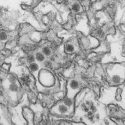Prevention steps encouraged after mumps diagnosis on campus
University Health Services (UHS) has confirmed that three UW–Madison students have recently been diagnosed with mumps. The cases don’t appear to be connected and UHS is working with public health officials to monitor the situation.
UW-Madison isn’t alone when it comes to mumps cases. A large outbreak of mumps occurred this spring at Ohio State University.
“Like the flu, most healthy people with mumps recover completely after a week or two,” says UHS epidemiologist Craig Roberts. “But it’s still a contagious and uncomfortable illness that may cause serious complications in some people.”
Mumps is a viral illness spread from person to person through the air or by direct contact with saliva or infected droplets. Early symptoms usually begin 16 to 18 days after infection and are similar to those of the flu: fever, headache, muscle aches and fatigue. Swelling of the cheek and jaw area (salivary glands) usually follows and is a classic symptom of mumps.
These recent cases serve as a good reminder to students, faculty, and staff to ensure that they’ve been fully immunized with two doses of the measles-mumps-rubella vaccine (MMR) and to take simple preventive steps such as washing hands regularly and staying home if they’re sick.
“Getting fully vaccinated is the most effective way to prevent mumps,” says Roberts. “Previously immunized persons could still become infected, but they will likely have a much less severe illness than unvaccinated people with mumps.”
Students who have not been immunized or only received one dose of the MMR vaccine can get their immunization at no cost at UHS or from their health care provider. Students that have previously received two MMRs do not need a third shot. Faculty and staff should visit their private health care provider.
There is no specific treatment available for mumps. Any students or faculty or staff members diagnosed with mumps or suspected of having mumps are expected to isolate themselves and stay home from work, school, sports and all public gatherings for five days after symptoms start.
As with any illness, remember to wash your hands frequently with soap and water, sneeze or cough into a tissue or your elbow, and avoid sharing drinks, food and utensils.
If you are a student and experience the symptoms described above, call UHS at 608-265-5600 or use MyUHS to make an appointment. Faculty and staff should contact their private health care provider.
For more information visit the UHS mumps FAQ page.



